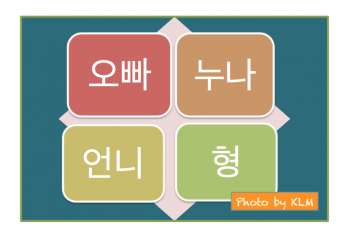Oppa, Unni, Hyung, and Noona: Age isn’t just a number in Korea Posted by Kyung-Hwa on Jul 11, 2018 in Korean Language, Vocabulary
If you are a big fan of K-pops, K-movies, and K-dramas, you often hear the following nouns by themselves or coming after someone’s name. : 오빠(oppa), 언니(unni), 형(hyung), and 누나(noona). Do you know what they mean?
Have you ever found yourself scratching your head because you are being asked this somewhat private question, “몇 살이에요? (How old are you?)” from a Korean who you newly met? Korean people often ask someone’s age because Korean language has different types of terms, which distinguish people, based on their ages. Furthermore, Korean people rarely address anyone who is older than themselves by a pronoun ‘you.’
Age is not just a number in Korea. The value of Confucianism is permeated in Korean culture and language. Showing respect for someone who is older, or with seniority status, than you are is a virtue in Korean culture. Thus, one’s age is relative to each other in a conversation because age differences determine the following factors in the Korean language:
- speech patterns: formal, polite, or casual way
- usage of proper terms that distinguish people based on ages
In general, 오빠 (oppa), 언니 (unni), 형 (hyung), and 누나 (noona) represent kinship terms among family members.
- 오빠 [oppa] addresses a ‘older brother’ of a female speaker.
- 언니 [unnie] addresses a ‘older sister’ of a female speaker.
- 형 [hyung] addresses a ‘older brother’ of a male speaker.
- 누나 [noona] addresses a ‘older sister’ of a male speaker.
However, the above terms are frequently expanded to address someone outside of the family members.
The following are some examples that you can consider using 오빠 (oppa), 언니 (unni), 형 (hyung), and 누나 (noona) to address someone:
- To refer your acquaintance (usually, who is less than a decade older than you are)
- Address someone who is older than you are in a friendly situation
- At a non-formal restaurant, when you need to grab the attention from a waiter or waitress
- When your boyfriend or girlfriend is older than you are.
These are some fun Korean songs for you to listen to relating to the above terms. I hope you will enjoy listening to them. ^___^
- 형 sung by 노라조 (Norazo)
- 오빠야 sung by 신현이와김루트 (Shin Hyun Hee and Kim Root
- 오빠는풍각쟁이야 sung by 박향림 (Park Hyang-rim)
* This fun song was released over 70 years ago and also used as a soundtrack of the movie 태극기 (Taegukgi).
- 오빠생각 sung by 트와이스 (Twice)
- 누나의 노래 sung by 린 (Lyn)
감사합니다. (Thank you!)

Build vocabulary, practice pronunciation, and more with Transparent Language Online. Available anytime, anywhere, on any device.





Comments:
Nancy:
Annneonghaseyo kyung wa!!!
I am from India. I like korean language and your culture. Started to learn korean language, as I was a great fan of k dramas, k food ( kimchi, kimbap…..) and the way you people giving respect to your elders. I need an advise from you on how to get a job and settle in rural south korea. Need a peaceful life, friend.
Kamsahamnida!!
Kyung-Hwa:
@Nancy An-nyeong-ha-se-yo!(안녕하세요!)
I enjoy eating Indian food and recently learned a lot about India in my government class.
Many of my friends love to watch Korean dramas as well. I think watching a Korean drama is a great way to immerse yourself in the Korean lanauge and culture.
My best wishes are with you!
Kam-sa-ham-ni-da! (감사합니다!)